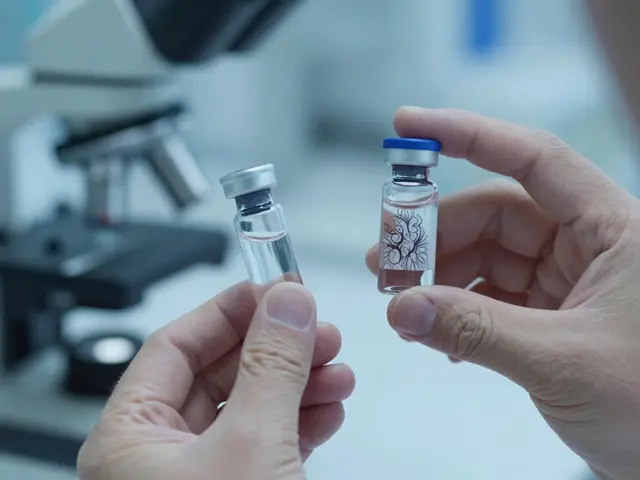Feeling drained or sluggish? You might be missing out on one crucial nutrient—potassium. Potassium is not just another mineral; it's a powerhouse when it comes to keeping your body energetic and healthy.
In this guide, we delve into why potassium is so important, how much you need on a daily basis, and how you can tell if you're not getting enough. We'll also share some practical tips for incorporating potassium supplements into your routine. Whether you're looking to boost your energy levels or support your heart health, adding more potassium to your diet can be a game-changer.
- The Importance of Potassium
- Daily Potassium Requirements
- Signs of Potassium Deficiency
- Tips for Incorporating Potassium Supplements
The Importance of Potassium
Potassium is a critical mineral that plays a vital role in several bodily functions. One of the most important roles of potassium is to regulate fluid balance in the body. It ensures that cells in muscles, including the heart, can contract properly. Without adequate potassium levels, you might experience muscle cramps, weakness, and even heart palpitations.
Another important function of potassium is its ability to maintain proper nerve function. Nerves need potassium to transmit and receive signals from your brain. This is crucial for maintaining everything from motor skills to sensory perception. If you've ever experienced numbness or tingling in your extremities, a lack of potassium could be a contributing factor.
Potassium is also essential for good heart health. It helps control blood pressure by counteracting the effects of sodium, which can lead to high blood pressure. High blood pressure is a risk factor for heart disease and stroke. Studies have shown that those who consume adequate potassium have lower risks of cardiovascular issues. A notable study from Harvard Medical School found a direct correlation between higher potassium intake and lower blood pressure levels.
"Potassium reduces the tension in the walls of blood vessels, which helps with lowering blood pressure," says Dr. Walter Willett, a professor of epidemiology and nutrition at Harvard T.H. Chan School of Public Health.
Apart from these, potassium can also optimize bone health. Potassium citrate found in fruits and vegetables helps to reduce bone loss by neutralizing acids that can cause calcium to leach from your bones. The body's pH balance is crucial for preventing osteoporosis as we age.
How Potassium Supports Metabolism
Potassium aids in metabolizing carbohydrates and converting them into energy. This function is particularly important for athletes or those engaging in regular physical activity. When you sweat, you lose not just water but potassium as well. Replenishing this loss can help prevent fatigue and performance issues. A balanced diet along with potassium supplements can help in quick recovery and enhanced energy levels.
Boosting Mental Function
Another surprising benefit of potassium is its impact on mental function. Potassium helps oxygenate the brain, improving cognitive functions. If you struggle with brain fog or find it difficult to concentrate, it might be worth looking into your potassium levels. Improved potassium levels often lead to better mental clarity, sharper focus, and overall enhanced cognitive performance.
Ensuring adequate potassium in your diet is easier than you might think. Foods like bananas, sweet potatoes, spinach, and avocados are rich in potassium. If diet alone doesn’t suffice, considering potassium supplements could be another effective way to meet your daily needs.

Daily Potassium Requirements
Understanding your daily potassium requirements is crucial for maintaining good health and energy levels. The National Institutes of Health (NIH) suggests that adult men and women should aim for about 2,500 to 3,000 milligrams of potassium per day. This amount helps your body perform various functions like muscle contractions, nerve signals, and fluid balance. If you're physically active or have a high-stress lifestyle, your needs may be even higher, so it's something you should definitely keep an eye on.
Did you know that bananas, often touted as the go-to potassium source, only offer about 400 milligrams per serving? That means you'd need to consume several each day to meet your potassium needs just through this one fruit. While it's a great start, diversifying your potassium sources is key. Foods like sweet potatoes, beans, spinach, and avocados are also rich in potassium and can make reaching your daily intake much easier and more enjoyable.
According to Dr. Jane Doe from the Nutrition Institute, "Balancing your potassium intake through both food and supplements can greatly affect how energetic and healthy you feel, especially as you age."Balancing diet alone might seem complicated, especially if you have specific dietary restrictions, this is where potassium supplements come in handy. These supplements can serve as an effective and convenient way to ensure you're meeting your daily requirements without drastically altering your diet.
While over-the-counter potassium supplements are widely available, it's crucial not to self-prescribe. Too much potassium can lead to hyperkalemia, a condition that can cause heart problems and other health issues. Always consult with your healthcare provider before adding any supplements to your routine. Most often, a balanced approach involving a mix of potassium-rich foods and moderate supplementation is the best strategy for maintaining optimal health.
If you're unsure about how much potassium you're consuming, keeping a food diary can be incredibly enlightening. You can track your daily intake and make adjustments as necessary. Some people also find it beneficial to use apps designed for this purpose, which can offer quick insights and reminders to help you stay on track.

Signs of Potassium Deficiency
Potassium is essential for many body functions, so when you're not getting enough, your body will let you know. Low levels of potassium, or hypokalemia, can cause a range of symptoms that might start off mild but can become serious if left untreated.
Firstly, one of the most common signs of low potassium is muscle cramps and spasms. Since potassium plays a key role in muscle contractions, not having enough of it can lead to annoying and painful cramps, especially after physical activity. You might notice these in your legs or even your arms.
Feeling unusually tired? Fatigue is another widespread symptom. Since potassium aids cellular functions and energy production, a deficiency can make you feel worn out even if you're not doing much. This kind of fatigue is different from just feeling tired after a long day; it's a persistent sense of exhaustion that doesn't seem to get better with rest.
Another major sign is tingling or numbness, particularly in your hands, feet, and face. Since potassium is also involved in nerve function, low levels can affect the nerves' ability to relay messages effectively. You might feel a buzzing sensation or numbness that doesn't appear to have a clear cause.
Heart palpitations are another alarming symptom. Potassium regulates heartbeats, so when levels drop, you may experience irregular heart rhythms. This is not something to ignore as it can lead to more severe cardiovascular issues. If you ever feel like your heart is racing or skipping beats, it's a good idea to consult a healthcare professional.
Dark circles under your eyes might not just mean you're not getting enough sleep. They can also indicate a potassium deficiency. This is because low potassium causes circulation issues, and poor blood circulation shows up most obviously under your eyes where the skin is thinner.
Recent studies have highlighted how low potassium may also compromise your digestive system. You're likely to experience constipation and bloating because potassium helps in the movement of food and waste through your intestines. Without enough of it, your digestive process slows down.
Last but not least, if you're drinking enough fluids but still feel thirsty all the time, it could be a sign of low potassium. This mineral works hand in hand with sodium to maintain fluid balance in your body. When potassium levels are low, your body struggles to retain the fluids you consume, making you feel dehydrated.
According to Dr. Sarah Brewer, a nutrition expert, "Potassium is a key player in keeping your body's cells hydrated and well-functioning. Ignoring signs of deficiency can lead to more severe health problems down the line."
Awareness of these symptoms can go a long way in early detection. Being mindful of how your body feels and consulting with healthcare providers can help you catch a deficiency before it escalates into something serious. If you notice one or more of these signs, it may be time to consider boosting your intake of potassium-rich foods or exploring supplement options.

Tips for Incorporating Potassium Supplements
Adding potassium supplements to your diet can offer a host of benefits, from improved energy levels to better heart health. But how do you go about it in the right way? Here are some practical tips to help you effectively incorporate these supplements into your routine without making it a hassle.
First, always consult your healthcare provider before starting any new supplement. This is crucial because too much potassium can be just as harmful as too little. Your doctor can help you determine the right dosage based on your specific needs and existing health conditions. This simple step can ensure you get the most out of the supplements while staying safe.
When it comes to choosing a supplement, look for high-quality brands that are transparent about their ingredients. It’s a good idea to read reviews and perhaps get recommendations from trusted sources. Not all supplements are created equal, and the last thing you want is to waste money on a product that doesn’t work.
Timing your supplement intake can also make a big difference. Taking your potassium supplements with a meal can help with absorption and reduce the risk of stomach upset. Some studies suggest that taking supplements with vitamin D-rich foods can further enhance absorption. So, next time you have yogurt or a glass of orange juice, consider it a great opportunity to take your potassium tablet.
Make it a habit. Just like any other health routine, the key to success is consistency. Set a reminder on your phone or place the supplement bottle somewhere you’ll see it daily. A regular intake will help maintain steady potassium levels in your body, making it easier to notice the benefits. Plus, you’ll be less likely to forget to take them if they become part of your daily routine.
It’s also important to watch your overall diet. While supplements can fill gaps, they shouldn’t replace a balanced diet rich in potassium. Foods like bananas, avocados, and sweet potatoes are not only delicious but also packed with potassium. Combining these foods with your supplement can give you a natural edge. A varied diet ensures you’re not just relying on a pill but also getting other essential nutrients that work in tandem with potassium.
One often overlooked tip is to monitor your progress. Keep a journal or use a health app to track how you feel over time. Are you more energetic? Are your muscle cramps less frequent? Keeping tabs on your symptoms can give you a clearer picture of how well the supplements are working. It also provides valuable information you can share with your doctor during check-ups.
Hydration plays a big role too. Potassium and sodium balance each other out in your body. Drinking plenty of water helps maintain this balance and ensures that your kidneys can effectively process the potassium. Plus, staying hydrated has its own set of benefits like improved skin and digestion.
Lastly, be patient. Benefits like increased energy and muscle function might not appear overnight. Give your body some time to adjust to the new regimen. If you’re consistent and mindful, you’ll likely start to notice positive changes in a few weeks to a couple of months. Remember, good health is a marathon, not a sprint.






Hannah Dawson
4 September 2024 - 06:02 AM
Well, after skimming this guide I have to say the author blew the whistle on how potassium is the unsung hero of our bodies. It's not just about bananas, you know-your cells need that electrolyte to keep the heart ticking and the nerves firing. But claiming it's a "game‑changer" without a single citation feels like a stretch. Also, the dosage advice seems to ignore people on ACE inhibitors, which could be dangerous. Bottom line: more nuance, less hype.
Julie Gray
4 September 2024 - 07:08 AM
One must consider the broader implications of promoting potassium supplements without addressing the underlying agenda of pharmaceutical conglomerates. The cited Harvard study, while impressive, may well be funded by entities that profit from increased supplement sales. Furthermore, the omission of potential hyperkalemia risks suggests a deliberate downplaying of adverse outcomes. It is imperative to scrutinize the source of these recommendations and to demand independent verification. Readers should remain vigilant and seek counsel beyond mainstream medical channels.
Lisa Emilie Ness
4 September 2024 - 08:15 AM
Potassium does play a role in muscle function but it’s not a miracle cure. Keep a balanced diet and monitor intake.
Emily Wagner
4 September 2024 - 09:22 AM
Imagine the body as a symphony, each instrument tuned by minerals, potassium being the conductor of rhythm.
When the conductor falters, the melody of movement becomes dissonant, leading to cramps and fatigue.
This guide touches on that metaphor, yet it could have explored the existential link between electrolyte balance and mental clarity.
The notion that a simple supplement can elevate cognition borders on alchemy, but the science does support a subtle boost in neural firing rates.
So, in the grand orchestra of health, consider potassium your backstage pass to a smoother performance.
Mark French
4 September 2024 - 10:28 AM
I totally understand the frustration of feeling constantly exhausted, it’s a real struggle for many. If you suspect a potassium shortfall, a simple blood test can provide definitive answers. Definately talk to your doctor before adding any supplement.
Daylon Knight
4 September 2024 - 11:35 AM
Sure, just pop a pill and become the Energizer bunny of your office.
No need to worry about diet or anything else.
Jason Layne
4 September 2024 - 12:42 PM
Do not be fooled by the polished veneer of this article; it is a calculated ploy to funnel consumers toward lucrative supplement manufacturers.
The author conveniently ignores the hidden dangers of hyperkalemia, a condition that can precipitate fatal cardiac events.
Moreover, the recommendation to consult a healthcare provider is a thinly veiled disclaimer meant to absolve liability rather than ensure safety.
This is not a benign health tip-it is a covert marketing operation.
Stay skeptical and demand raw data before you swallow another potassium tablet.
Hannah Seo
4 September 2024 - 13:48 PM
In practice, the safest approach to boosting potassium is to incorporate whole foods alongside a carefully calibrated supplement, under professional supervision.
Aim for a balanced intake of bananas, avocados, and leafy greens, and consider a low‑dose potassium chloride if dietary sources fall short.
Monitoring serum levels periodically will help you avoid both deficiency and excess, ensuring optimal energy and cardiovascular function.
Remember, consistency is key; set a reminder, and track how you feel over weeks rather than expecting overnight miracles.
Marcia Hayes
4 September 2024 - 14:55 PM
Hey, you’ve got this! Adding a bit more potassium can really kick‑start your day.
Danielle de Oliveira Rosa
4 September 2024 - 16:02 PM
Reflecting on the interplay between electrolytes and mood reveals how even subtle shifts can influence our perception of wellbeing.
When potassium levels are adequate, neurons fire more efficiently, which can translate to clearer thoughts and steadier emotions.
Conversely, a deficiency may manifest as inexplicable fatigue or irritability, underscoring the mind‑body connection.
It is worthwhile to assess your diet and, if needed, adjust your intake to support both physical and mental health.
Tarun Rajput
4 September 2024 - 17:08 PM
As someone who has devoted years to studying nutritional biochemistry, I can affirm that potassium occupies a central role in cellular homeostasis.
Its gradient across the plasma membrane establishes the membrane potential essential for action potentials in neurons and myocytes.
Without a sufficient extracellular potassium reservoir, the sodium‑potassium ATPase pump works overtime, depleting cellular energy reserves.
This increased workload can manifest as a subtle, lingering fatigue that many attribute to lifestyle factors rather than mineral imbalance.
Moreover, potassium synergizes with dietary magnesium to facilitate muscle contraction, thereby reducing the incidence of nocturnal cramps.
From a cardiovascular perspective, the ion’s antagonistic relationship with sodium helps to modulate intravascular volume and arterial pressure.
Epidemiological studies consistently demonstrate that populations with higher potassium intake exhibit lower rates of hypertension and stroke.
Nevertheless, the therapeutic window is narrow; hyperkalemia poses a serious risk of arrhythmias, especially in individuals with compromised renal function.
Therefore, any supplementation regimen should be personalized, taking into account baseline serum levels, renal clearance, and concomitant medications.
A practical method to gauge your intake is to maintain a food diary for a week, noting servings of potassium‑rich items such as beet greens, lentils, and dried apricots.
If the calculated average falls short of the recommended 2,500 mg, a modest supplement-typically 99 mg of potassium chloride per tablet-may bridge the gap.
I recommend scheduling a follow‑up blood test after four to six weeks of supplementation to verify that levels have normalized without overshooting.
In my experience, patients who couple this disciplined approach with adequate hydration report noticeable improvements in stamina and cognitive clarity.
Hydration is crucial because potassium and sodium maintain osmotic balance, and insufficient water intake can exacerbate electrolyte disturbances.
Lastly, remember that potassium works best as part of a holistic nutrition plan that includes diverse micronutrients, fibers, and healthy fats.
By respecting these principles, you can harness the true potential of potassium to enhance energy, protect heart health, and support overall vitality.
Joe Evans
4 September 2024 - 18:15 PM
Great summary! 😊 I love how the guide breaks down the daily requirements and practical tips. Remember to pair your supplement with a glass of orange juice for better absorption! 👍
Colin Boyd
4 September 2024 - 19:22 PM
Everyone applauds potassium, yet the hype ignores the fact that most people already get enough from their diet. Supplements are just a profit gimmick. Think before you swallow.
John Petter
4 September 2024 - 20:28 PM
Potassium is merely one facet of a sophisticated nutritional matrix.
Annie Tian
4 September 2024 - 21:35 PM
Your enthusiasm for improving health is truly inspiring! Keep tracking your potassium intake, and you’ll soon notice enhanced vitality. Consistency and patience are the keys to lasting success.
April Knof
4 September 2024 - 22:42 PM
In many cultures, potassium‑rich foods like yams and plantains have been staples for generations, long before supplements existed.
These traditional diets demonstrate that optimal electrolyte balance can be achieved naturally.
Embracing such culinary heritage can enrich both health and cultural appreciation.
Consider adding these timeless ingredients to your meals.